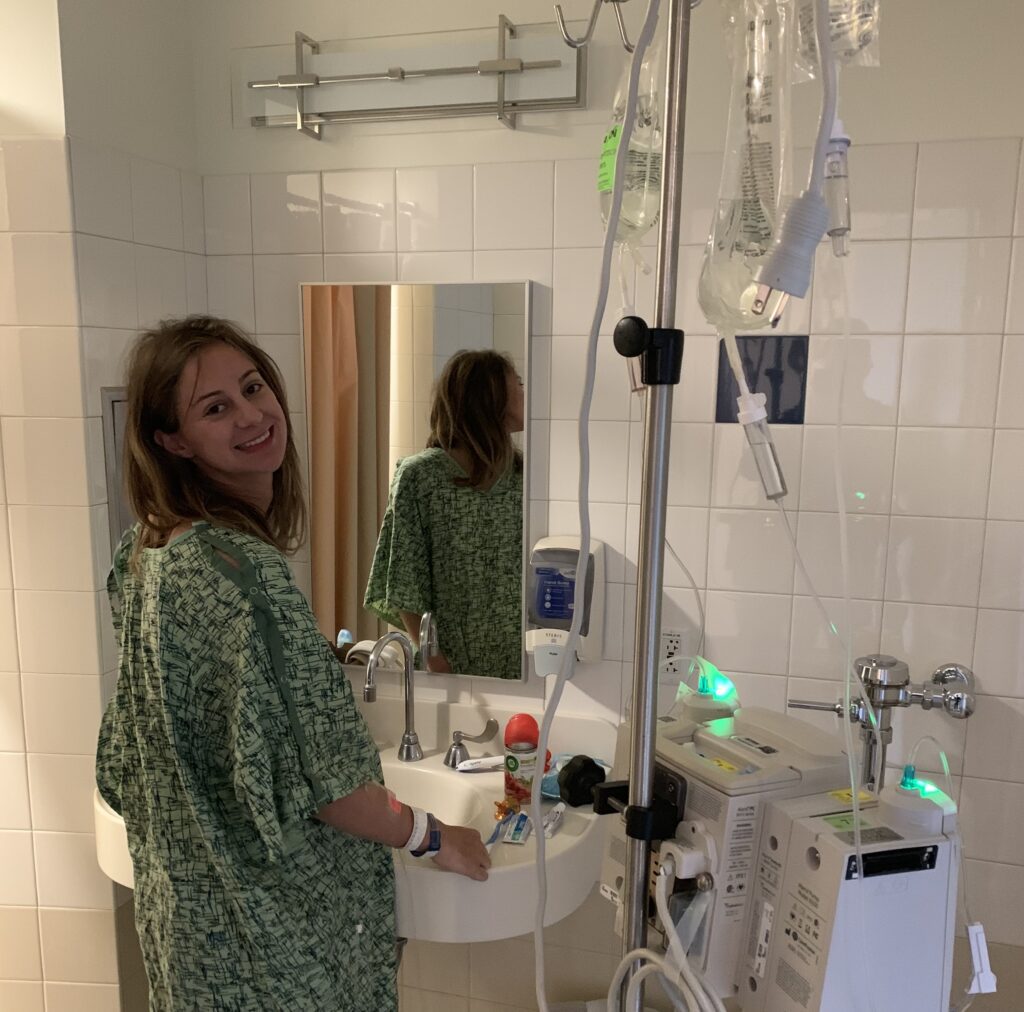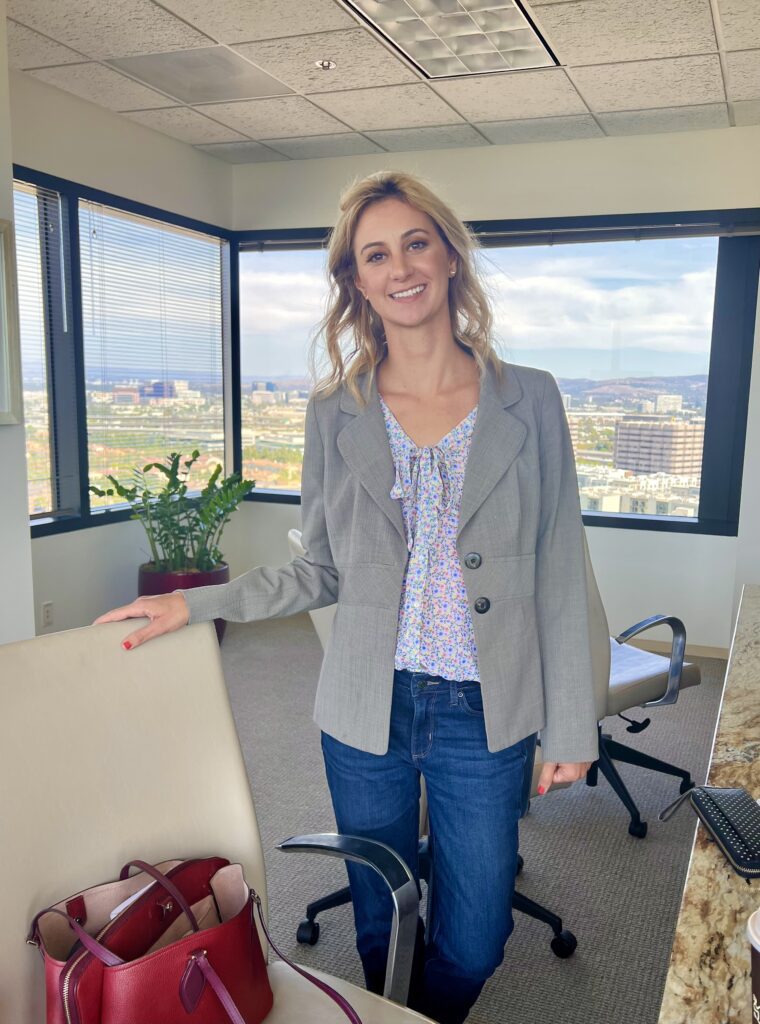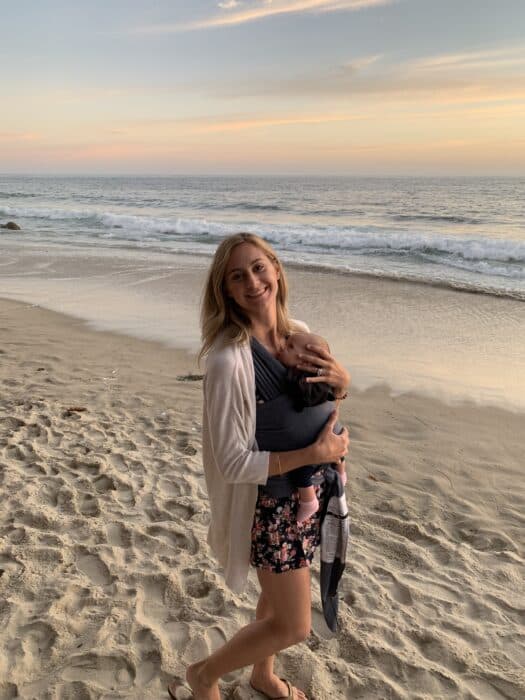I was 11 years old when my journey with OCD began. I was away from home and anxious about it. I didn’t like being away from my family. I began to have a fear that I would somehow lose control of my body and do something to physically hurt someone. The entire week I stayed away from my classmates, making sure I walked at least six or seven feet away from them at all times.
When I returned home from camp I was noticeably different. I was crying every night. I was too afraid to tell my parents what was going on. I felt like a terrible person. I worried that I would scare them if I told them about the intrusive thoughts I was having. I felt alone and sad. I wanted to tell them but it was just too difficult.
Thankfully my parents knew I was not acting like myself. They were determined to get me help and they spoke with a clinician who suggested that I may have Obsessive Compulsive Disorder (OCD). At this time, however, I did not receive a formal diagnosis.
Just before leaving for college, I spoke to a psychiatrist about my mild-to-moderate “anxiety” flare-ups and ruminating thoughts. I was misdiagnosed with Generalized Anxiety Disorder (GAD) and prescribed a low dose of Prozac, which kept the symptoms at bay.

I was a Junior Olympic competitive gymnast and was recruited to a Division I school at age 17. When I arrived at school and began training, my whole world changed. I was living in a new environment, trying to adapt. My coach immediately became emotionally, verbally, and psychologically abusive. He used derogatory terms toward me almost daily in practice and pitted team members against each other, we had nowhere to turn for support. I was then sexually abused by our head trainer just before I retired from gymnastics.
The trauma that I experienced during this time in my life impacted me on so many levels. The OCD symptoms that I had developed earlier in life came flooding in.
I was able to go on to graduate from college. Unfortunately, I developed a chronic pain condition and additionally had two reconstructive ankle surgeries, which left me unable to walk unaided for over a year. My “perfectionism” had always fueled my success in gymnastics but was now breaking me down emotionally and psychologically. With nowhere to direct the perfectionistic tendencies that had made me a successful athlete and student, I became more and more unable to cope with my new daily life. I was lucky to have my husband as my rock and my ultimate support system. We also had a wider support system of close friends and family who we could reach out to and who would help me to maneuver the tough days ahead.
While still healing from surgery and learning to live with an unrelated chronic pain condition, I became unable to shut out the mentality that my coach had ingrained in me every day: that I was stupid, weak, and nobody would ever take me seriously. I believed that in order to feel good about myself, I had to push myself far past my limits. I began working a stressful job and attending graduate night school, thinking that if I could earn a graduate degree, I could convince the world and myself that I wasn’t stupid after all.
During all of this chaos, I discovered that I was pregnant. My emotions soared. I was filled with joy while at the same time, shocked. I felt unprepared and not ready. Could I take care of myself and a baby? During my third trimester of pregnancy was when I really started to struggle as the OCD began to tighten its grip on me once again. I remember laying in bed one night and having panic attacks. It felt like they would never stop. I felt completely trapped and lost in my own mind. I barely slept that night. I couldn’t stop ruminating over the idea that, not only wasn’t my life orderly and perfect anymore, but even my own thoughts weren’t perfect. I became convinced that my thoughts were making me sick and was petrified by the fact that I could not control them.
My daughter who was still in my womb became the focus of relentless intrusive thoughts. I envisioned something terrible happening to her. I began to struggle to be around my family, the people that I cared for the most. The most gruesome and violent images attacked my mind. Things that had previously brought me joy, alluded me.
Writing, which had always been my hobby and creative outlet, became completely hijacked by OCD. I spent hours making lists, drawing charts, and writing repeated phrases trying to convince myself that I wasn’t a bad person and that this wasn’t my fault. The only thing that brought me peace was reading my Bible and telling God the truth about what was going on with me.
I went to see a psychiatrist, who began prescribing me Ativan, which at the time I didn’t realize was exacerbating my depression and causing me to fall into a cycle of addiction. I knew I was in a crisis. I wanted to seek help. I felt that I needed to go to the hospital, to tell someone how bad this actually was and that I wanted help. What was stopping me? I heard my coach’s voice in my head telling me I was faking it, I was stupid, I was weak. I heard him whisper in my mind, that if I told someone how bad this really was, they would laugh at me.
Things came crashing to breaking point when I was 9 months pregnant. My sister popped in for a surprise visit. God sent her to me that day to stop me and to protect my baby. My husband, who was the hero who carried me through the darkest moments of my life, took me to the hospital where I was placed on a psychiatric hold on the labor and delivery floor. From there, everything changed. I was finally in a place that could help me. I struggled to ask for the help that I needed. The nurses gave me a shoulder to cry on and listened to me without judgment. I began the difficult process of detoxing off the Ativan. I began to be prepped for an induction due to a psychiatric emergency. I was started on medications that helped to stabilize my mood. I finally felt safe.
I remember clearly, for the first time in a very long time, that I started to look forward to things again.
Just prior to the birth of my daughter, my previous therapist contacted me in the hospital, while on my psychiatric hold. He said that it was ridiculous that I was there and that he could make sure that I was sent home immediately. This same psychiatrist had not only failed to properly diagnose me with Obsessive Compulsive Disorder (OCD) but had also prescribed me medication that was dangerous to my unborn baby. This led to me becoming addicted and needing to detox. I was frustrated and confused. But I knew what I needed to do. For the first time in my adult life, I stood up for myself. I could still hear the faint words of my former coach telling me that I was laughable, weak, and making it all up. But I stood firm in my stance and said “no, I want to be here. I need to be here.” I hung up the phone and never spoke to or saw that doctor again.

While the road after that was not easy, God poured a newfound grace and joy over me. The depression lifted with the help of my family, doctors, therapy, and proper medication. While this therapy had allowed me to discuss my feelings and heal from depression, it was doing nothing to lessen my OCD symptoms. I was happy and healthy again, but still victim to the OCD cycles. My son was born just one year later, and shortly after his birth, I began experiencing flashbacks of the year before. Thankfully my moods were much more stable, however, my OCD had come back with a vengeance. The compulsive cleaning and organizing began. In addition to the writing and list making, which took hours of my time, I spent all evening after work organizing the house, dusting, cleaning, and making sure that all of our furniture in our new townhome was symmetrical and orderly.
The countless hours I spent on my compulsions took away from the time I spent with my husband and babies, and I regularly missed full nights with them because I felt I didn’t deserve to relax until the house was perfectly in order.
The flashbacks to the year before became stronger and stronger, until one day I called my therapist and broke down, expressing my terror at the idea of returning to the state I was once in. My psychiatrist recommended my admission into an intensive outpatient program (IOP). I was unsure that the IOP was a good idea because it would require time away from work and my kids, but my husband assured me that it would be helpful to me and most importantly, to our family. Admitting myself to the IOP was one of the best decisions I ever made. It was there that I met other women who were wonderful, kind, accomplished, and healing from the debilitating effects of postpartum depression and OCD. I realized that nobody was going to laugh at me or tell me I was weak, stupid, or crazy. Nobody was going to tell me I was lazy or didn’t know how to work hard (which my former coach regularly told me) if my house wasn’t spotless. I learned how to ask for help and that opening up to others about your pain was okay, unlike what I had learned from my college coaches who had conditioned us to hide everything. I was officially diagnosed with Post-Traumatic Stress Disorder (PTSD) and OCD while in this program. Shortly after I transitioned out, I found that any place offering specialized OCD therapy was either too far, too expensive, or not compatible with my schedule. I was referred to a therapist who did CBT but who did not specialize in Exposure and Response Prevention (ERP) treatment. She told me that she believed I would benefit from something she’d heard about recently, NOCD. I was skeptical at first and thought that it sounded too good to be true.
NOCD ended up being the resource that changed my life.
When I first called for the initial intake contact, I remember thinking that there must be a catch. I had never tried ERP before. I had fears that I would be the only person who ever was treatment-resistant. Doubts about the effectiveness of treatment crept into my head, fears that I would not actually get better. I felt like I might be a lost cause.
Instead, the most amazing thing occurred. I gained my life back. I am now able to spend time with my loved ones, my husband, and my children. Not just time but quality time. I enjoy them and they enjoy my company. I am no longer distracted by the things left undone in my home. The list-making and hours spent in repeated reassurances have become a thing of the past.
I stopped having to bring a pen and paper with me everywhere, hiding them in my bag in case I needed to write down safety phrases. I now bring my journal with me when I travel to record my memories, my successes, my hard days, and what I want to write about instead of what I need to write about. I’ve learned how to recognize OCD traps that I never even knew existed.
I’ve learned to sit with discomfort instead of pushing it away or trying to reason with it.
I went on to sue my alma mater for what they did to me and how deeply their actions destroyed me. This year I began publicly advocating against bullying, harassment, intimidation, shaming, and assault within NCAA athletics.

I’ve referred others to NOCD and have watched them heal and finally get the specialized treatment they need. My husband has a happier wife and my children have a happier mother. My family gets the best version of me now, the one that OCD didn’t get to take from me. I will never say that I’m glad that this all happened. But I will say that God graced me and restored me in more ways than I can describe.
My journey has deepened my understanding of others’ pain. It is a sobering gift but a profound and valuable one.
Looking back to that day, three years ago, in the moments when I felt death tapping on my shoulder, I promised I would one day use my story as a weapon against it. It is important to me that others feel safe from this beast that is OCD. I want others to know that the end of their journey is not at the bottom of OCD’s dark well.

